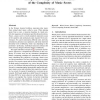Free Online Productivity Tools
i2Speak
i2Symbol
i2OCR
iTex2Img
iWeb2Print
iWeb2Shot
i2Type
iPdf2Split
iPdf2Merge
i2Bopomofo
i2Arabic
i2Style
i2Image
i2PDF
iLatex2Rtf
Sci2ools
OOPSLA
2015
Springer
2015
Springer
Musiplectics: computational assessment of the complexity of music scores
In the Western classical tradition, musicians play music from notated sheet music, called a score. When playing music from a score, a musician translates its visual symbols into sequences of instrument-specific physical motions. Hence, a music score’s overall complexity represents a sum of the cognitive and mechanical acuity required for its performance. For a given instrument, different notes, intervals, articulations, dynamics, key signatures, and tempo represent dissimilar levels of difficulty, which vary depending on the performer’s proficiency. Individual musicians embrace this tenet, but may disagree about the degrees of difficulty. This paper introduces musiplectics1 , a systematic and objective approach to computational assessment of the complexity of a music score for any instrument. Musiplectics defines computing paradigms for automatically and accurately calculating the complexity of playing a music score on a given instrument. The core concept codifies a two-phas...
Related Content
| Added | 16 Apr 2016 |
| Updated | 16 Apr 2016 |
| Type | Journal |
| Year | 2015 |
| Where | OOPSLA |
| Authors | Ethan Holder, Eli Tilevich, Amy Gillick |
Comments (0)

